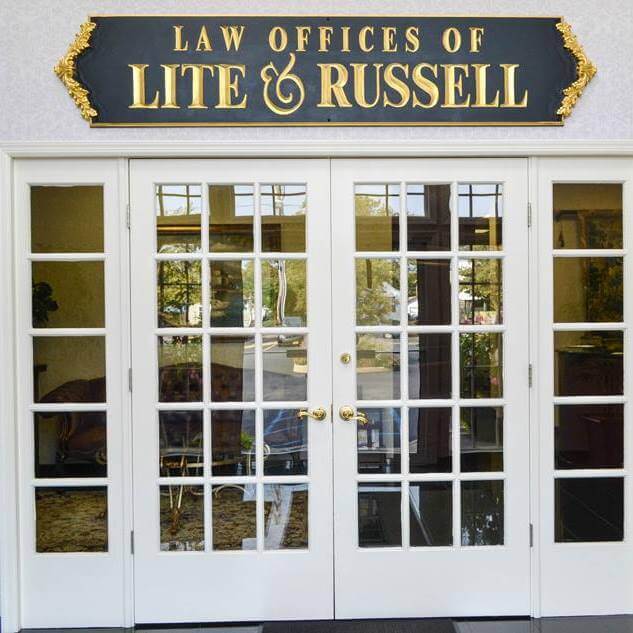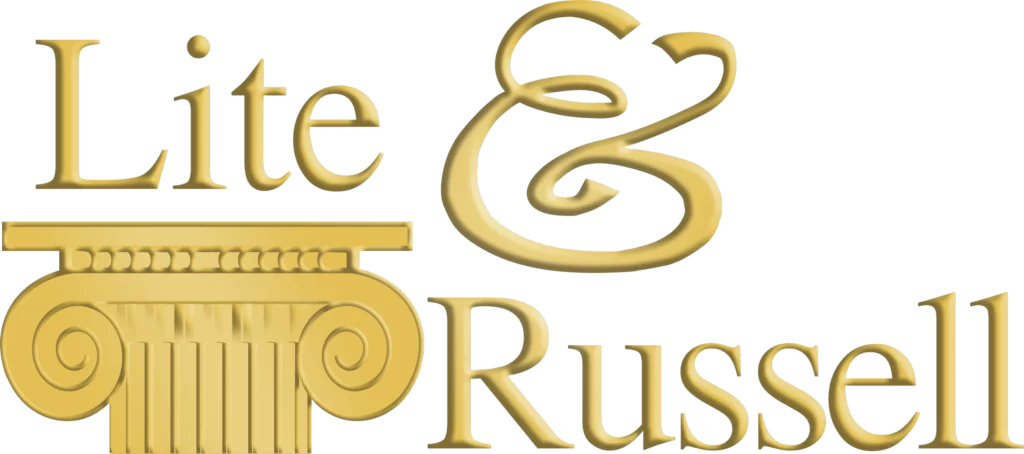Estate Planning and Administration
Lite & Russell handles and maintains a concentration in Estate Planning and Administration.
As an overview, this area of law may be segregated into two (2) separate areas, Estate Planning and Estate Administration.

Estate Planning
It is recommended that all people consider having a free consultation to discuss their estate plan or review an existing plan. Regardless of your age, status and personal wealth, everyone should consider a few basic estate planning documents:
Last Will and Testament. Generally referred to as a will. A will is a written document that addresses many issues and considerations. Primarily, a will should provide the disposition of your property and assets upon your death. It will also designate who will be in charge of your estate to insure that your directives are followed. We call that person your executor (male) and/or executrix (female). The will should also designate the person who will take care and custody of your minor children if both parents or natural guardians expire: that person is referred to as the guardian. You may also designate a person to handle your children’s property and finances if both parents are deceased, namely a trustee, and at what ages or in what intervals moneys and property should be released to your child(ren). Your will is an important document, some say the cornerstone of your estate plan.
The will can be tailored to your specific needs and concerns. It is generally suggested that you meet with one of the members of our firm to discuss your personal situation and intentions so that we may confer, and suggest and tailor a document to address all of your concerns.
In addition to the Last Will and Testament, we generally recommend three (3) additional documents: a Durable Power of Attorney, a Health Care Proxy, and a Living Will.
A Durable Power of Attorney is a document in which a person designates another person or persons to act on that person’s behalf in the event that the appointing person is incapable of acting on his/her own. While a Last Will and Testament will address your concerns upon your death, while a person is still alive and unfortunately incapable or incompetent to act for any reason, physical and/or mental, it is very important that you appoint someone else, usually a spouse, relative or close friend, to handle your affairs. In the absence of a Power of Attorney, your relatives may be unable or limited to handle your affairs and may have to resort to the courts to have a person judicially appointed, which would involve considerable time and expense. Simply stated, a Power of Attorney is another pillar in support of a basic estate plan.
A Health Care Proxy is very similar to a Power of Attorney in that you designate an individual or individual(s) to make decisions on you behalf. Unlike a Power of Attorney, however, the Health Care Proxy is specifically limited to medical and health-related issues. Again, you always maintain the absolute, unfettered right to make your own personal health decisions, but if you are unable to do so, it is recommended that you appoint a health care agent to make such decisions.
A Living Will is a document that contains specific instructions and your personal directions for your family and medical professionals to follow in the event that you are terminally ill and do not wish to the kept alive by artificial means.
The documents and information provided herein are only a basic preview or introduction to the legal services and representation that we offer to our clients. Obviously, these documents address major life issues and decisions that will impact you and your family. Our advice and representation will be based upon your personal needs. We again welcome the opportunity to meet with you and perhaps other members of your family; and, if necessary, other professional individuals, such as your accountant or financial advisor, all at no charge to insure that your estate plan addresses all of your concerns. Finally, our firm is staffed and equipped to represent you and to provide professional services with matters involving all kinds of trusts, and references for complex elder care planning matters.
Estate Administration
The firm of Lite & Russell also handles Estate Administration matters that generally arise upon the death of an individual.
Although death is a natural aspect and unavoidable consequence of life, it also gives rise to many issues or concerns that could have tremendous impact upon your surviving loved ones. For such reason, it is very important to have an estate plan. Even if you do not have an estate plan, certain issues may arise which need to be addressed.
We generally suggest that you contact our office if you lose a loved one. It is not necessary that you address such issues immediately or prior to the funeral. The law allows and actually expects the process to take months (not years) to accomplish.

If the decedent had a Last Will and Testament, the interested person(s) or designated Executor(trix) usually contacts an attorney to initiate the process, referred to as probate. The proponent, generally by his/her attorney(s), will apply to the Surrogate’s Court for his/her appointment; and, absent a contest, will fulfill his/her duties within a reasonable period of time. Eventually, the Executor(trix) will distribute or disburse the estate properties in accordance with the decedent’s Last Will and Testament and conclude the matters with the proper guidance and legal representation; the probate process can be relatively straightforward, timely and cost-effective.
If the decedent did not have a Last Will and Testament, the law will impose a scheme or method of distribution. We refer to this process as administration. The scheme or method will depend on who are the decedent’s next of kin or closest surviving relatives. For example, in the absence of a will, if the decedent is survived by a spouse and children, the law provides that the first $50,000.00 and one-half (1/2) of the decedent’s remaining assets go to the spouse, and the remaining one-half (1/2) is distributed to the decedent’s children pro rata. Similar to as occurs in a probate matter, eventually the Administrator(trix) will distribute or disburse the decedent’s assets in accordance with the statutory scheme imposed and conclude the process.
Lite & Russell has over fifty (50) years of combined legal experience, and is equipped and staffed to handle all kinds and phases of estate administration, throughout the Long Island area and the greater metropolitan region. We welcome the opportunity to extend our professional efforts to expeditiously represent and assist you and your family in these types of matters
